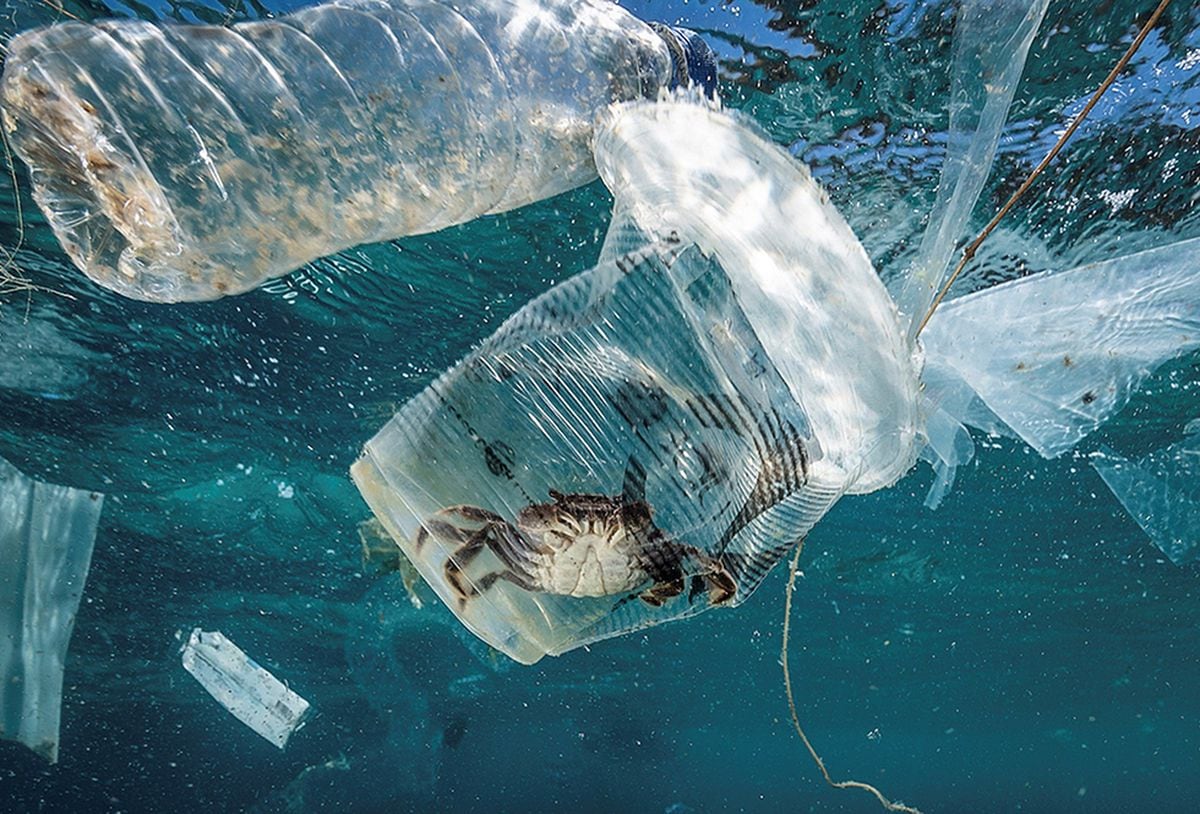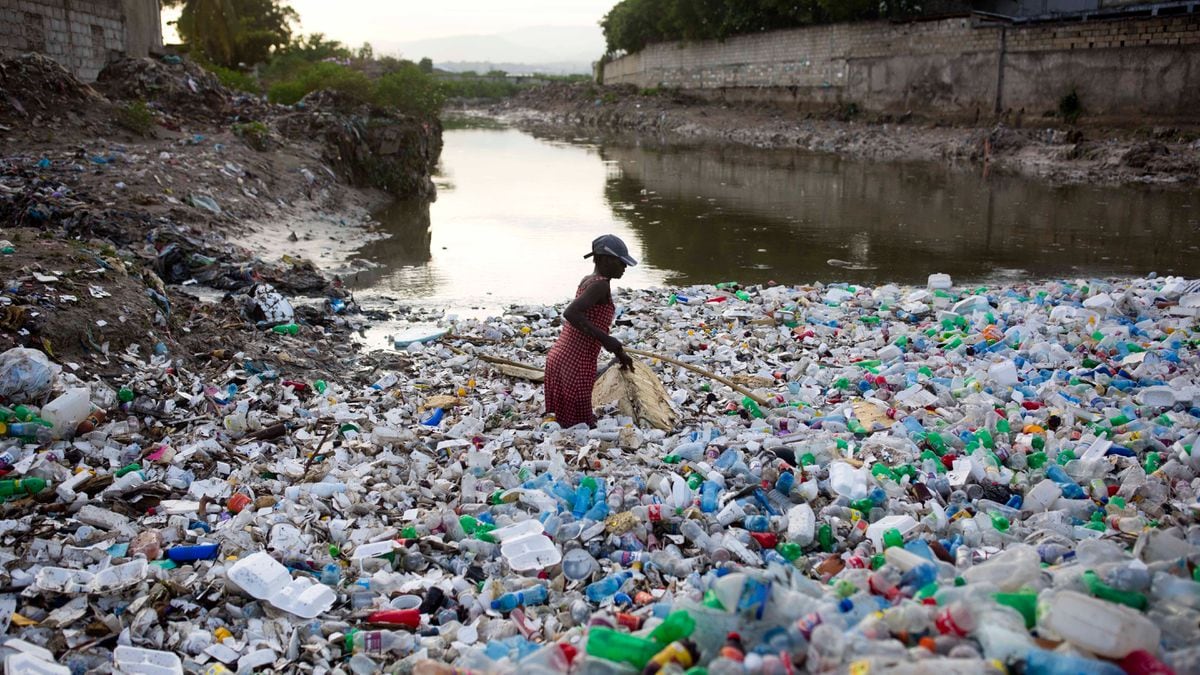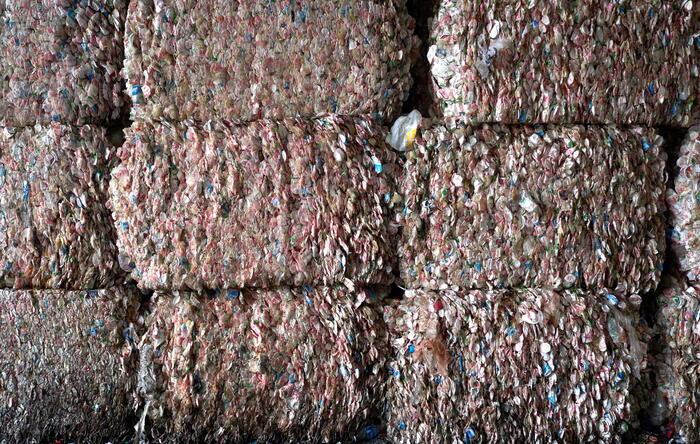Recycling is at the heart of the debate on the fight against the invasion of plastic. The United Nations is looking for ways to get the world to recycle within the strategic objectives of the treaty against plastic pollution being negotiated this week in Paris. While environmental groups warn of the problems of giving new life to polymers without reducing the production of this material, which is spreading uncontrollably throughout the planet. They also criticize that Europe relaxes even the requirements to consider greena plastic container containing recycled material.
Paris hosts a United Nations meeting that started on Monday and will last until next Thursday in which a text is expected to come out to advance a legally binding global treaty against plastic pollution. Among the objectives of the United Nations Environment Programme (UNEP) is to reduce the use of virgin plastic through reuse or recycling, as well as to decrease the health risk of the more than 13,000 chemicals containing these polymers. The document that sees the light in the French capital will still have to be discussed in future appointments so that it can be adopted in 2024.
At the same time that this global treaty is being negotiated, a coalition of environmental organizations – including Ecologists in Action, Environmental Coalition on Standards (ECOS), Transport & Environment and WWF – reproaches that in Europe they want to consider green a container as a plastic bottle from 65% recycled material in its manufacture, within the European environmental taxonomy. After the controversy over the inclusion of natural gas or nuclear energy in the list of sustainable investments in Europe – when they meet a series of requirements – for this coalition of environmentalists, the relaxation now of the plastic requirements again facilitates the greenwashing of the industry. "To label the production of single-use plastic packaging as sustainable would be to make the same mistake," says Sara Bourehiyi, spokesperson for Ecologists in Action. "Taxonomy emerged as an official tool based on scientific criteria and again we are seeing that this is not the case. Only with science will we be able to not exceed 1.5 ° C, "he warns.
More information
UN agreement to launch first international treaty to curb plastic pollution
Initially, the green taxonomy proposal required plastic packaging to be made from a minimum of 85% recycled material, which would now be allowed to be reduced to 65% in the case of plastic packaging in general. A change advocated by Plastics Europe in Spain, which represents the producers of this material. For this organization, "manufacturing with 85% recycled plastic was not feasible from a technical perspective, considering the current level of collection and classification of plastic waste in EU Member States."
The head of biodiversity at Greenpeace, Celia Ojeda, who also rejects that a plastic container can be considered green, understands that recycling itself is a problem because it diverts attention from the serious contamination of these polymers around the planet. "This material has reached its peak, we produce plastics above what we can manage, less than 9% is recycled worldwide and in Spain only 21%. In the end everything is tricks to avoid going to a real reduction in production. Having alternatives that are only based on plastic doesn't make sense because we will have the same problem when we finish using it."
Treaty measures
Recycling is also at the heart of this week's plastic pollution treaty negotiations in Paris. As part of the solution, but also part of the problem. UNEP presented a report in mid-May in which it develops a series of measures to reduce global plastic pollution by up to 80% by 2040. The document, considered as a guide, starts from the premise that the current recycling system is not working, since it is still cheaper to produce virgin plastic than to recycle existing plastic. To get it reused more, the report proposes the creation of a tax on the use of virgin plastic. UNEP is also committed to the use of refillable bottles, bulk dispensers and deposit and return systems.
Criticism of recycling comes in this case from the health side. UNEP had already warned about "the more than 13,000 chemicals contained in plastics, of which more than 3,200 are known to be dangerous to human health." However, the surprise has been a report by Greenpeace United States presented last week that also points to recycling. "The toxicity of plastic actually increases with recycling. Plastics have no place in a circular economy and it is clear that the only real solution to end this pollution is to massively reduce production," said Graham Forbes, head of Greenpeace USA's global plastics campaign.
Therese Karlsson, scientific advisor to the International Pollutant Elimination Network (IPEN), warns in the Greenpeace report: "Plastics are made with toxic chemicals, and these do not simply disappear when they are recycled. Science clearly shows that recycling is a toxic endeavor with threats to our health and the environment throughout the entire process."
Epidemiologist Miquel Porta, researcher at the Hospital del Mar Medical Research Institute and professor of Public Health at the Autonomous University of Barcelona, also says about these problems. According to him, polymers can contain molecules that are toxic such as phthalates and phenols that reach the human body through fast food containers, cans or containers. These containers are coated with bisphenol A, a chemical that has been shown to increase the risk of type 2 diabetes.
The researcher also warns that bottled water, if it is in the container for a long time, can store phenols. Although the risk of refilling the bottle is rarely similar to when it is purchased, he believes, it is not the same as passing from the factory to a person's mouth to remain stored or in trucks with high temperatures, as this would increase the risk of toxic substances being released. And he adds: "A bottle of that material will always, sooner or later, give off waste, even come out with microplastics directly from the factory."
You can follow CLIMA Y MEDIO AMBIENTE on Facebook and Twitter, or sign up here to receive our weekly newsletter








/cloudfront-eu-central-1.images.arcpublishing.com/prisa/2RQK76CJRZCS5KCBA56WRJ5CEU.jpg)






